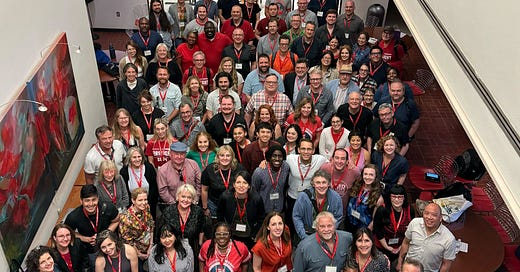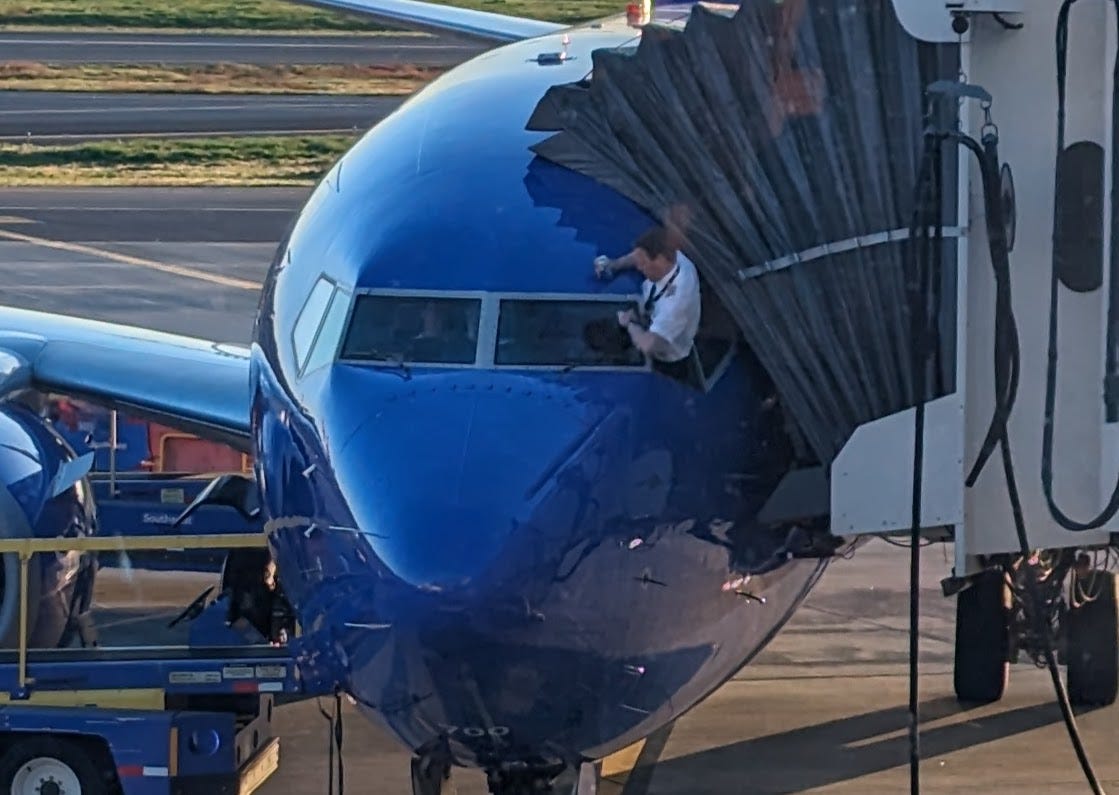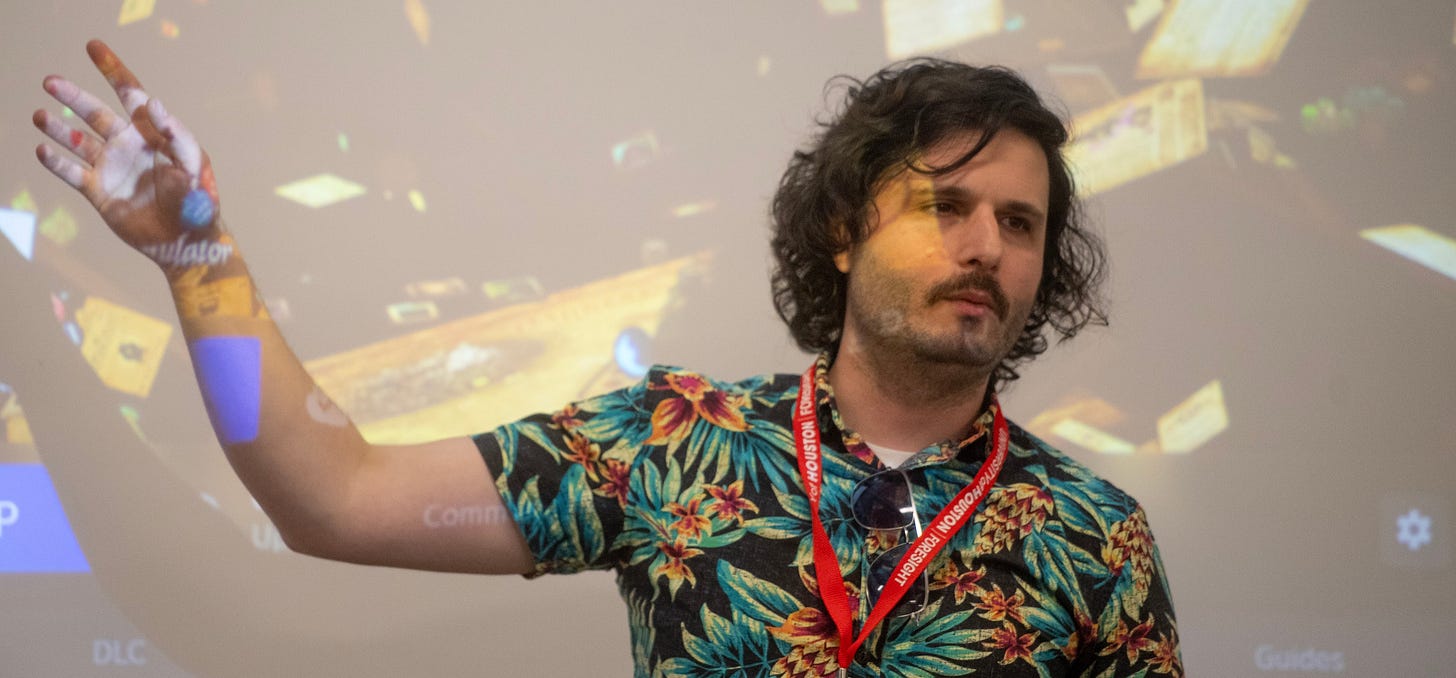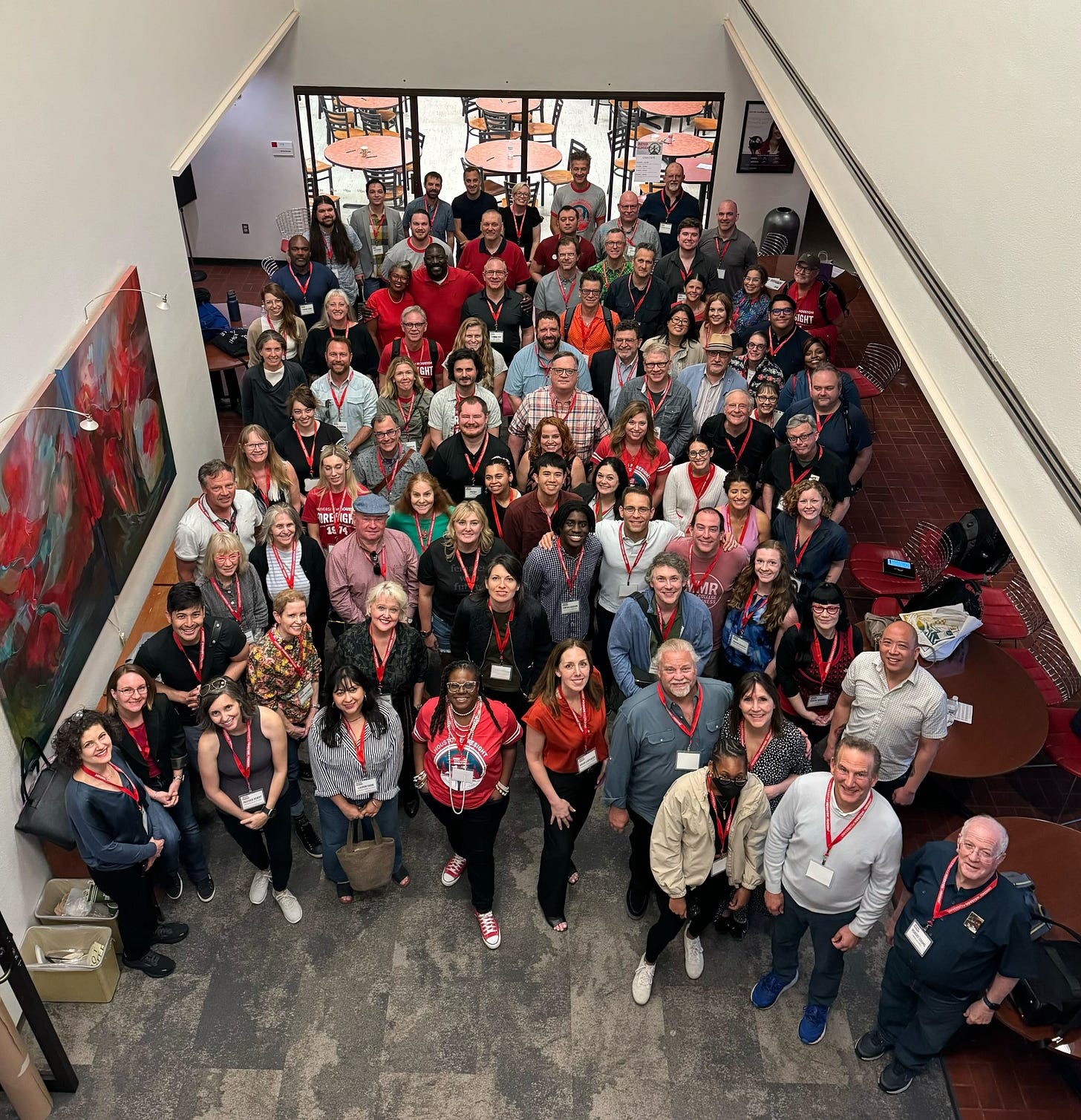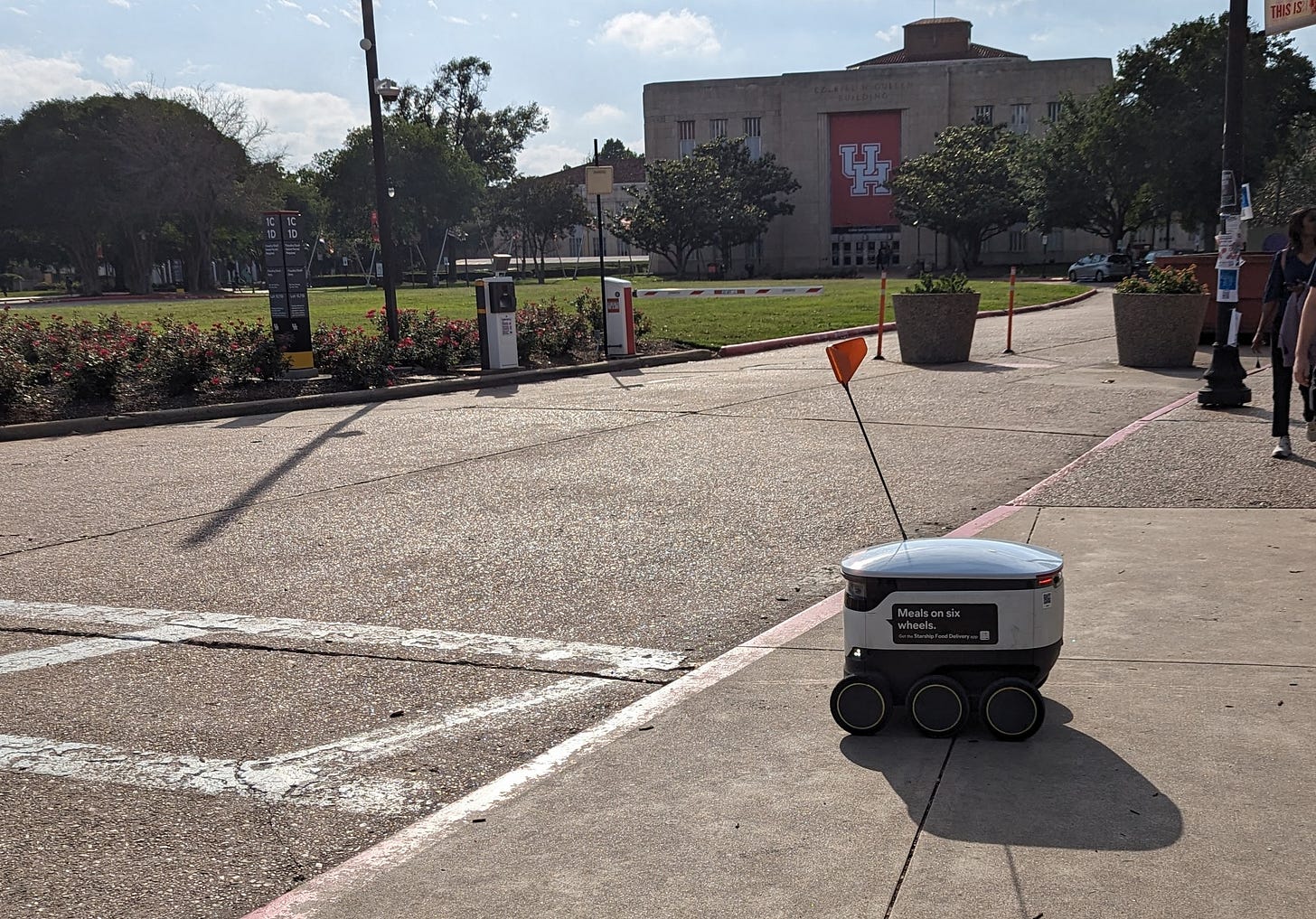In mid-April I had the privilege of attending the University of Houston’s annual Spring Gathering. The theme for the event was “Being and Becoming Human”, so many of the sessions were focused on how the basics of how we conceive of ourselves as a species. This was my first time attending this event, and I was shocked to see how many students, alumni, and faculty attended - well over 100. The amount of loyalty and connection that people feel to this graduate program (that most people find mid-career and complete online, no less) is remarkable. I learned so much and there was also an incredible social atmosphere with lots of fun and connection1 and Tex-Mex for every meal for some reason.
Heading out, I was a little apprehensive to see my pilot hanging out the window washing the windshield - what do they do if it gets dirty midflight? I usually fly Alaska, and these questions just don’t come up - don’t sit by the exit row and everything will work out fine.
Also, at the social hub Airbnb, there was a black widow spider hanging out in the garage; I don’t know if I’ve ever seen one of those in the wild before.
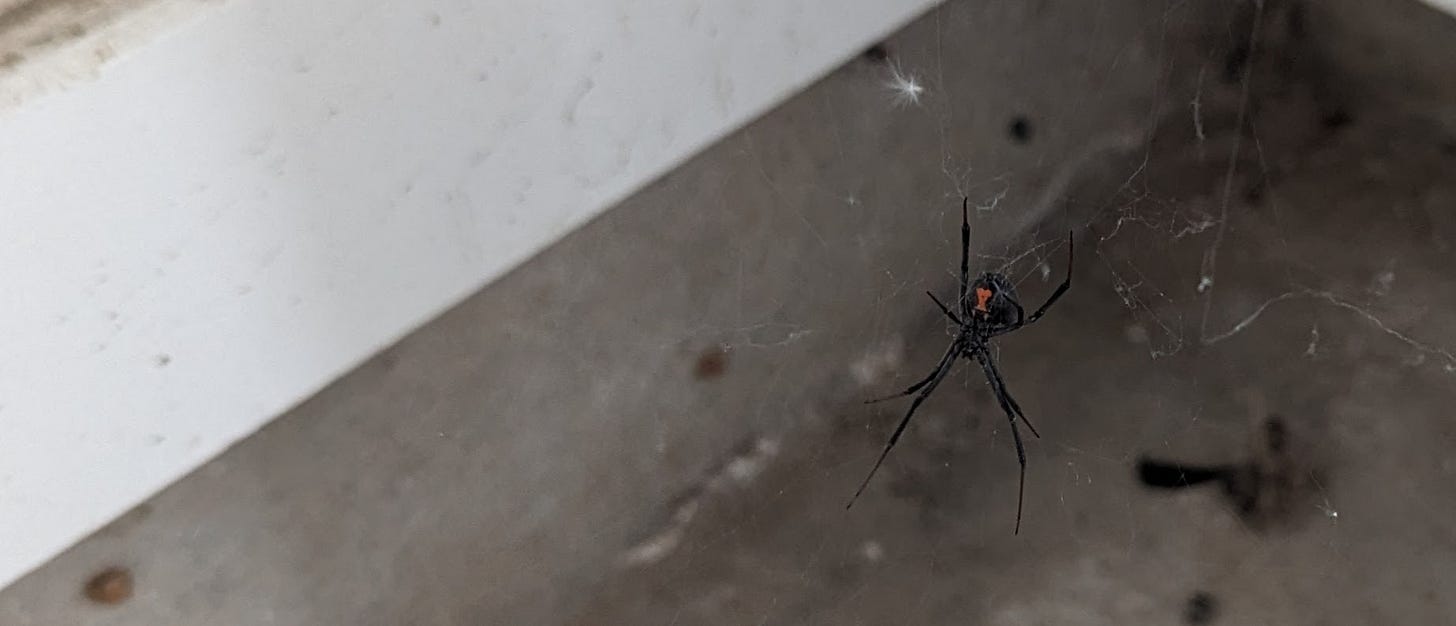
Highlights
The main point of this week’s post is to highlight some of the amazing work I saw at the event. There was more great work that I saw than I can talk about here2, and even more great work that I didn’t get to see because of all the concurrent sessions. I did present during the sessions to show alumni the latest tools being used by students, but it’s nothing you haven’t already heard about several times. Note that while there are some links to slides in here, and these may be useful, they certainly don’t replace having been there for either the presentation or the discussion (I certainly don’t build my slides to stand on their own).
Classmate and fellow Oregonian Karessa Torgerson shared some weak but real signals about a “human singularity” - not the runaway improvement of AI but technology enabling humans to more directly communicate brain-to-brain in a way that bypasses language, and what the implications of access to such radical empathy might be3. For a taste of the idea, you can read her speculative fiction piece on the APF website.
The inimitable Andy Hines, who leads the program, gave an incredible presentation on the future of work, which may be the end of work. I loved this session because it was clear that he was packing 30 years of research into 45 minutes. He did a great job with simple activities that demonstrated his points in a visceral way, like having people introduce themselves without referencing a job/career.
Mina McBride presented some great provocations, asking what might happen if some common pieces of conventional wisdom were wrong. For example, people in the US are thinking about the coming climate migration to cities in the North in places like the Great Lakes, but what if people just refuse to move or the transition happens much slower than we think? After all, people often have a strong emotional attachment to land, the three most predictable words after a disaster are “we will rebuild”, and the government might face intense pressure to provide coverage as an insurer of last resort.
My Australian classmate and friend Jen Stumbles not only won the award for most miles traveled to get to the event, but also gave two separate presentations: one about a full workflow4 for tracking items during active and passive scanning and getting them ready for use in specific projects, and one about her great (APF-award-nominated) student research work about the future of secondary education in Australia.
Elizabeth Herfel and David Jonker from SAP shared about the Open Foresight Hub, a wiki of foresight resources including terminology and tools, links to foresight work from everywhere, and even things like a crowdsourced list of drivers. The problem with these projects is always keeping them current and searchable, and if the community can support that I can see this being a great place to go for background on prior futures work on a subject, drivers to explore, etc.
There’s no way to say enough about program alum/faculty/etc Juli Rush’s contributions to the event’s success. Juli helped plan and run the event, including coordinating food, lodging, and even airport pickups5. In addition, Juli gave a preview of what looks like an incredible summer course on the psychology of futures, in part about how being exposed to potential futures (previously-unanticipated events, or the possible loss of something cherished) can cause grief6, anxiety, or other emotions in participants, and how foresight professionals can help guide people through that process well.
Here’s (almost) everyone, most of whom I was able to meet and interact with during the weekend:
I hear that plans are already brewing for next year, and I have every intention of going back7. Nicci, Juli, April, and so many others did amazing work to organize the event. I’m so fortunate to be part of such a brilliant and supportive group of professionals.
Including a real-life peek at the future: it was my first time being in a group conversation where one person sat down with us, put on an Apple Vision Pro, and proceeded to poke and pinch the air in front of him. Buckle up, it’s weird. Also, there were these cute little food delivery robots skittering around everywhere on campus:
For example, former program director Peter Bishop made a guest appearance and participated in a panel on cultivating community.
The discussion for this session got philosophical really fast: whether ideas and memories can exist independently from language, whether we’d be as eager to experience this radical empathy as to have others do so, etc.
Jen is really interested in tools, and does the community a great service by collecting them and organizing them and her notes on them for anyone to use.
Many other Houston locals deserve praise here as well, such as Sarah Wheeler and Jeremy Wilken.
Juli, in addition to being a middle-school teacher (where, of course, she integrates futures thinking into the curriculum), is a certified death doula with a certificate in Thanatology and has done interesting work on grief and futures.
Next year’s gathering coincides with the 50th anniversary of the program, and I’m excited to see how we end up acknowledging the occasion.

